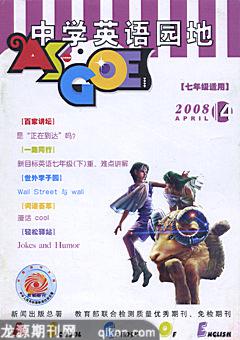新目标英语七年级(下)重点词语解析(Units 6~7)
沈 浩
Unit 6 Its raining!
1. rain n. 雨 v. 下雨
Hows the weather? Its raining. (P32) 天气怎么样?正在下雨呢。
There was rain in the night. 夜里下雨了。
It was rainy last week. 上星期多雨。
[解析] rain作不可数名词用时,意为“雨”,作动词用时,意为“下雨”。 rainy为形容词。 heavy rain意为“大雨”,light rain意为“小雨”,不可用large和small来修饰rain。 例如:
There was a heavy rain last night. 昨晚下了一场大雨。
It is raining hard outside. 外面正下着大雨。
2. really adv. 真正地;确实
The people are really very relaxed! (P35) 人们确实很放松。
I really like the girl. 我真地喜欢这个女孩。
Im not really interested in fishing. 我不是真地对钓鱼有兴趣。
[解析] really是副词,意思是“真正地、确实”,用来修饰形容词、动词,一般位于形容词、动词的前面或系动词的后面。例如:
This film is really interesting. 这部电影确实很有趣。
He is really a coward. 他真是个胆小鬼。
real是形容词,指人或物客观存在,而不是想象或幻想出来的。它的含义是“真的;真正的;正宗的 ”,与“假冒的”相对。 real在句中可作定语,修饰名词,也可单独作表语。例如:
His real name is Shen Yang. 他的真名叫沈阳。
This story is not real,it is only imaginary. 这个故事不是真的,只是虚构的。
3. vacation n. 假期
There are many people here on vacation. 有许多人在这儿度假。
[解析] vacation在英国指大学的寒假、暑假或法定休息的日子,在美国指任何假日/假期。 on vacation表示“度假”。
holiday意为“假日、休假”,在英国英语中指人们不上班或不工作的日子。 a holiday可以是“一天假期”,也可以是“一次(几天)假期”。 holidays泛指“假日”。例如:
Ill take a months holiday. 我要休假一个月。
When does the summer holiday start? 暑假什么时候开始?
leave也可作“假期”解,on leave意为“请假”。例如:
She went home on leave. 她请假回家了。
Unit 7 What does he look like?
1. hair n. 头发;毛发
Hes tall and he has brown hair. (P43) 他个子高高的,长着一头棕色的头发。
They have long hair. 他们留着长发。
[解析] hair作“头发、毛发”解时,是集体名词,在句中作主语时,谓语动词为单数形式。例如:
Her hair is black. 她的头发是黑色的。
当表示一根根或一缕缕头发时,是可数名词。例如:
He has a few white hairs. 他有几根白发。
男子理发用have ones hair cut(剪发);女子理发用have ones hair done(做头发)。例如:
Hes going to have his hair cut. 他想去理理发。
She is going to have her hair done at the barbers. 她打算去理发店做头发。
2. joke n. 笑话; 玩笑 v. 开玩笑
Xu Qian loves to tell jokes. (P43) 许倩喜欢讲笑话。
Our English teacher often tells jokes in class. 我们的英语老师经常在课堂上讲笑话。
[解析] joke作可数名词用时,意为“笑话”,“玩笑”。含joke的常用短语有:tell sb a joke(给某人讲个笑话),play a joke on sb(开某人的玩笑,戏弄某人),make a joke about sb/sth(拿某人/某事开玩笑),have a joke with sb(与某人说笑话)。例如:
Dont play jokes on her. She is shy. 不要和她开玩笑,她很害羞。
注意:可以用tell表示讲笑话或说笑话,但不可以用say。 试译:他讲了一些极为滑稽有趣的笑话。
误:He said some funny jokes.
正:He told some funny jokes.
joke作动词用时,意为“开玩笑”。例如:
I was only joking with him. 我只是和他开个玩笑。
3. good-looking adj. 好看的;美丽的
Shes good-looking but shes a little bit quiet. (P43) 她长得漂亮但有点内向。
[解析] good-looking可以用来形容女性,也可以形容男性,指外表一般性地“好看、美丽”,一般不用于修饰物。例如:
She is a good-looking woman. 她是一个五官清秀的女子。
而beautiful是最普通的用词,意为“美丽的、漂亮的”,可形容给人以美感的人或物、景色等。形容人时,一般指女子。例如:
She is a beautiful girl. 她是个美丽的女孩。
These pandas are very beautiful. 这些熊猫很漂亮。
The West Lake is famous for its beautiful scenery. 西湖以风景优美著称。
pretty有“秀美、娇媚”之意,常用来形容年轻姑娘、小孩以及小巧玲珑的物品等。例如:
She has a pretty daughter. 她有一个漂亮的女儿。
4. never adv. 从不;决不;一点也不
She never stops talking! (P43) 她总是不停地讲话。
She is never late for the meeting. 她开会从不迟到。
[解析] never是一个具有否定意义的副词,它位于be动词/助动词/情态动词之后,实义动词之前。例如:
I will never be the first to do this kind of thing. 我决不会第一个去做这种事。
He never tells lies. 他从不撒谎。
通常情况下,句子中用了never,就不再用not,no,nothing等否定词。试译:他一向无所事事。
误:He never has nothing to do.
正:He never has anything to do.
5. great adj. 伟大的;非常的;重大的;崇高的
I dont think hes so great. (P45) 我觉得他不怎么样。
Beethoven was a great musician. 贝多芬是一位伟大的音乐家。
[解析] great常用来修饰抽象名词,修饰具体的人或物时,常带有一定的感情色彩。例如:
He is a man of great learning. 他是个很有学问的人。
China is a great country. 中国是一个伟大的国家。
big与great的区别在于:big指具体事物的大,多用来表示面积、范围、程度、体积等的大,与small相对。例如:
The sun is bigger than the moon. 太阳比月亮大。
This is a big room. 这是一个大房间。

